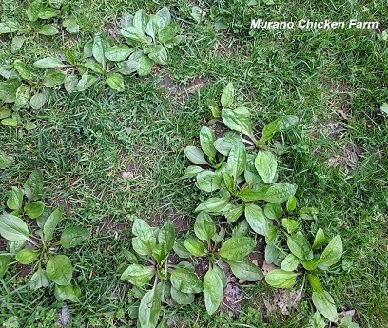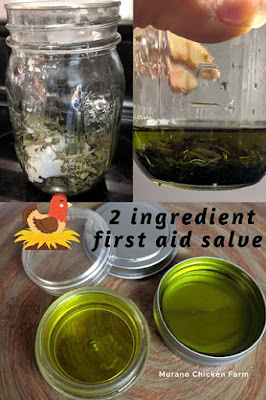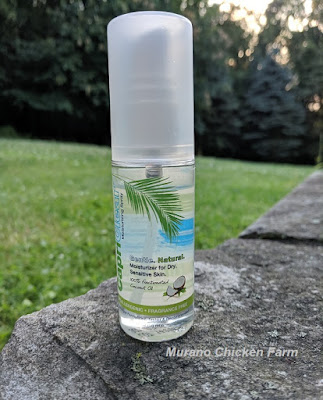So today I want to give you my recipe for a wound 'salve' that can be used on chickens and talk you through making your own! While I have been using herbs on the humans in the household for years I only recently started using it on chickens. My friend Lisa over at Fresh Eggs Daily is an herbal genius as far as chicken care goes, and she inspired me to expand my herbal practices to chickens
This is the easiest and cheapest herbal wound treatment you can make. It can be used on cuts, scrapes, bug bites, plucked feathers and other minor skin irritations. It will relieve mild pain, itch and stings and it may help prevent infection.
Plus I picked an herb that literally grows everywhere so you definitely have access to it. In fact, you're probably familiar with it as a weed! The truth is that there are several herbs that can help to heal a wound. If you have some of the others, then add them in! I actually grow several herbs that are great for this purpose and I'll list other beneficial herbs down below plus a more complex recipe.
Today though I wanted to go super simple with 2 ingredients, both chosen because you probably already have them.
2 ingredient chicken wound salve
Our herb for this "salve" is plantain. I used quotations around salve because it's more of a solid oil than an actual salve. Our oil is coconut oil. That's the whole recipe! Easy...right?
The herb Broadleaf Plantain (Plantago major) has many amazing uses especially for cuts and bug bites. It really takes the 'owe' and itch out of cat scratches too! Plantain is a perennial 'weed' you probably have growing in your yard or garden. Not to be confused with the banana type fruit you see in some stores. There are about 250 different species of plantain but we're looking at 'Plantago major'.
Coconut oil is well known for its anti-inflammatory properties. It soothes the skin, soaks in easily and eases inflammation by improving antioxidant status. It is also anti-microbial which may help prevent infection. Related reading: Research study on animal wound healing when applying coconut oil.
Gather and prepare the plantain
I chose plantain for this recipe since not only is it effective, but it literally grows everywhere! You should have some growing in your yard or garden somewhere...or in sidewalk cracks, maybe along the edge of the house. You can literally find it anywhere.
Make sure you collect plantain that has not been sprayed with pesticides, weed killers or other chemicals. You can order some plantain here if you can't find it locally.
I like to use dried herbs when I infuse them to prevent the risk of mold from moisture. Pick some fresh plantain from your yard or garden and place it in your dehydrator for a few hours or pop the leaves in the microwave to dry them quickly. Related reading: harvesting and drying plantain.
Once dry, crush the plantain and place it in a mason jar. Add a dollop of coconut oil to the jar and put the lid on loosely. There should be just enough oil to cover the dried herb once it's melted. I place the jar on the warmer on my stove top to melt the coconut oil. You can use a double boiler or crock pot to melt and keep your oil warm while it infuses. Let it infuse for about 6 hours.
When the oil is ready, line a funnel with cheesecloth and place the funnel in a clean jar. Pour the oil and herbs into the cheesecloth and allow the oil to drain out. Pour the strained oil into tins or small containers. Allow to cool then store in refrigerator.
Use on small cuts, scrapes, abrasions, stings, bug bites, frostbite or other mild irritations. This can also be used on bare backs of hens during molting or over breeding BUT if you are putting this on exposed skin and they are going out into the sun you 'll want to put a chicken saddle on them first.
Oil based products on skin in the sun will cause a sunburn, so protect the skin with some type of barrier or only put it on overnight or on overcast days.
Variations of the herbal wound salve recipe
Option 1: Three ingredient solid salve for chicken skin irritations
If you want to make a shelf stable salve, you'll need one more ingredient but you're already halfway there! We're going to use the same proportions I used in How to make a burn salve on my other site.
1/2 cup of plantain infused coconut oil
1/2 ounce beeswax
You'll put the plantain infused oil in a double boiler and turned the heat on medium. Once warmed thoroughly, turn off heat and add 1/2 ounce of beeswax and let it melt. It melts quicker if you use the pastilles, but chopped up beeswax blocks work just as well. Pour into a small jar or tin and let cool. This salve will not need refrigerated.
Option 2: Two ingredient herbal spray oil for chickens
If you want to make a liquid oil to spray on instead of one that will become solid below 76°F, you will substitute the regular coconut oil for fractionated coconut oil. This is a form of coconut oil that has had the long-chain fatty acids removed via hydrolysis and steam distillation. This oil is always liquid. Follow directions as above, but pour into a spray bottle after straining.Option 3: Other herbs to add to your poultry wound salve
Here are some other herbs that can help heal small wounds and skin irritations in chickens. I don't have exact measurements since you can make as much or as little as you'd like. Just make sure you have enough coconut oil to cover the dried crushed herbs in the jar.Calendula: anti inflammatory, antimicrobial, antibiotic and antifungal. Soothing to skin and can increase blood flow, which heals wounds faster.
Chamomile: accelerates the healing process, soothing, promotes healing, anti inflammatory, antioxidant, antimicrobial and antiseptic properties.
Chickweed: good for inflammation, abrasions and burns. Is a weed, grows wild like plantain.
Comfrey: anti inflammatory, helps to speed up healing.
Yarrow: helps to heal wounds, speeds up blood clotting, anti-bacterial and anti inflammatory.
Related reading: Yarrow salve by Modern Homestead Mama
Adding other herbs or beeswax makes the recipe a little more difficult, but if you have them on hand then give it a try. You'll probably create a salve that you love to use!
Want to know more about health and illnesses your flock may be exposed to? Click here for my other posts on chicken health!
Want information on raising chickens sent right to your email weekly? Click right here to join my list and get new posts sent directly to you the day they're published ... plus, you'll also get the free download '25 Ways to save money raising chickens'.
I am not a veterinarian or other animal care professional nor do I claim to be. I am simply passing on information that has worked for me and my flock. This information is for entertainment purposes only and is not meant to treat or diagnose any medical condition. Please see a vet if your chicken is ill. Click for my full disclaimer.
This post contains affiliate links. If you chose to purchase something through the link, I will get a small payment from Amazon. It will not affect your purchase price. Click for full disclosure.






avid chook reader..what is the link to your herb posts please?..Fiona B
ReplyDeleteThey are right here: https://www.feathersinthewoods.com/search/label/Using%20herbs
DeleteHope you like them!
Lisa
Thank you so much for all the wisdom and experience you've shared!! So so helpful!!
ReplyDelete